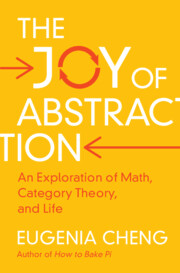Book contents
- Frontmatter
- Dedication
- Contents
- Prologue
- Part One Building up to Categories
- Interlude A Tour of Math
- Part Two Doing Category Theory
- 14 Isomorphisms
- 15 Monics and epics
- 16 Universal properties
- 17 Duality
- 18 Products and coproducts
- 19 Pullbacks and pushouts
- 20 Functors
- 21 Categories of categories
- 22 Natural transformations
- 23 Yoneda
- 24 Higher dimensions
- Epilogue Thinking categorically
- Appendices
- Glossary
- Further Reading
- Acknowledgements
- Index
21 - Categories of categories
from Part Two - Doing Category Theory
Published online by Cambridge University Press: 13 October 2022
- Frontmatter
- Dedication
- Contents
- Prologue
- Part One Building up to Categories
- Interlude A Tour of Math
- Part Two Doing Category Theory
- 14 Isomorphisms
- 15 Monics and epics
- 16 Universal properties
- 17 Duality
- 18 Products and coproducts
- 19 Pullbacks and pushouts
- 20 Functors
- 21 Categories of categories
- 22 Natural transformations
- 23 Yoneda
- 24 Higher dimensions
- Epilogue Thinking categorically
- Appendices
- Glossary
- Further Reading
- Acknowledgements
- Index
Summary
We gather small categories and functors into a category Cat, taking care with size issues to avoid a Russell-like paradox. We consider some functors from Cat to Set, and to the category of graphs and their morphisms. We sketch a free category functor. We look at structures in Cat, much as we have done with other examples of large categories of mathematical structures. We examine terminal and initial objects in Cat, then products and coproducts, and the relationship between (co)products in Cat and those in the categories of posets or monoids. We examine isomorphisms in Cat and show that these exhibit categories with the same arrow structure, such as the cube of factors of 30 and the cube of three types of privilege. We discuss the fact that this concept is overly strict, as it invokes equalities between objects, showing that Cat strains at its dimensions and is trying to expand into higher dimensions. This leads us to the definition of full, faithful, and essentially surjective. We show that full and faithful functors reflect isomorphisms. We define pointwise equivalence and discuss the sense in which this is a version of bijection, not of isomorphism.
- Type
- Chapter
- Information
- The Joy of AbstractionAn Exploration of Math, Category Theory, and Life, pp. 309 - 327Publisher: Cambridge University PressPrint publication year: 2022



